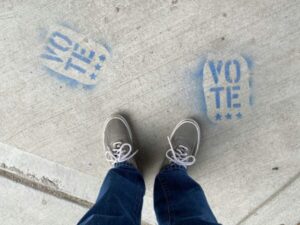
Course Details
Date
January 13 to February 16, 2025
Language
English
Alternative
Modules
5
January 13 to February 16, 2025
$95.00
New Digital Investigative Techniques to Supercharge Your Reporting
Want to take your investigative reporting to the next level? Join “New Digital Investigative Techniques to Supercharge Your Reporting,” a five-week online course organized by the Knight Center for Journalism in the Americas. From January 13 to February 16, 2025, investigative experts Craig Silverman and Jane Lytvynenko will teach you the latest tools and techniques to uncover stories in the digital age.
You will learn cutting-edge strategies for finding people and information, get introduced to mapping tools and approaches to geolocating images and videos, try out some of the latest tools for tracking the digital footprint of people and companies, and get a no-code introduction to using AI in your reporting. You’ll also learn how to create an efficient workflow to gather, organize, and archive the digital assets you collect.
This course is open to anyone interested in learning about how to advance their digital investigative skills and toolkit. Journalists, editors, librarians, researchers, students, and faculty should enroll. Those already involved in journalism and digital investigative work are encouraged to join the course to add to the discussion and provide additional insight on the topic.
This course is asynchronous, meaning there are no required live events, and you can complete activities at your own pace throughout each week.
The material is organized into six modules covering various topics through videos, guest speakers, readings, and discussion forums:
Introduction Module – Fundamentals
In the introductory module, you will get an overview of the course structure and meet the instructors. You’ll also read about the fundamentals of digital investigations and get your computer set up with the correct (free!) software and plugins.
Module 1 – Workflow and archiving
One of the most challenging aspects of digital investigations is ensuring you’re gathering and organizing all the profiles, websites, screenshots, and other information in a way that makes it easy to analyze and include in a story. It’s also important to set yourself up for future success by collecting the tools you need in an easy to access way. We’ll show you how.
This module will cover:
- Best practices for collecting digital assets and how to use free tools like Osinttracker to visualize connections
- Using tools like the Wayback Machine and others to archive content
- Auto-archiving to archive.org and the Bellingcat auto archive tool
- Approaches to organizing and archiving visual material
Module 2 – Search and sourcing
With this module, we’ll look at approaches for using Google advanced search to aid our reporting. From there, we’ll look at how we can use the tool to find sources on various social media platforms. Then, we’ll snowball our findings across various social media platforms.
This module will cover:
- Google advanced search for individuals, documents, and social media groups
- Using various social media platforms to look for eyewitnesses or first-person media
- Cross-referencing information on various social media platforms to build on what we’ve found
Module 3 – Visuals and mapping
We’ll dig into fundamental approaches for analyzing visual material. From there, we will go over Geolocation and dig into mapping and satellite services to build on our findings.
This module will cover:
- Image analysis fundamentals and geolocation approaches
- Creating maps for your investigations
- Understanding public mapping and satellite services to aid your reporting
Module 4 – Investigating people and companies
People and/or companies appear in most, if not every, story. This week shows you how to use a range of useful tools for researching usernames, email addresses and phone numbers, and walks you through useful databases for backgrounding names and companies.
This module will cover:
- Fundamentals for digital backgrounding of people and companies
- How to use username, email, and phone number enumeration tools
- Databases for researching companies
Module 5 – Using AI in your reporting
There’s a lot of hype about Artificial Intelligence. Our final module focuses on a few straightforward ways to integrate AI into investigative work.
This module will cover:
- The basics of AI tools like large language models like ChatGPT and some simple rules for how to use AI in reporting.
- Using AI to assist with online searches and document analysis
- New tools for using AI to analyze images and video

Craig Silverman is an award-winning journalist and author and one of the world’s leading experts on online disinformation, fake news, and digital investigations. He’s a national reporter with ProPublica, where he investigates digital platforms and online manipulation. He’s also the editor of the European Journalism Centre’s Verification Handbook series and writes the Digital Investigations newsletter. Craig previously served as media editor of BuzzFeed News, where he pioneered coverage of digital disinformation and media manipulation.

Jane Lytvynenko is an award-winning reporter in the field of disinformation and online investigations. She recently joined the Technology and Social Change Project at the Shorenstein Center at Harvard University as a senior research fellow. At Harvard, she is focusing developing training on investigating disinformation and researching the issue for the Media Manipulation Handbook. Lytvynenko previously spent nearly five years at BuzzFeed News, where she was a senior reporter. Her work has focused on the rise of conspiracy theories, hyperpartisan news, and extremism globally. Her investigative work has uncovered a secretive extremist organization operating in the US, disinformation network operators who manipulate social media on behalf of state actors, and online hucksters seeking to scam people out of their livelihoods. Lytvynenko also pioneered a method bringing swift and accessible debunks to mass audiences during breaking news situations which has been replicated worldwide. Jane was born in Kyiv, Ukraine and resides in Toronto, Canada.
This course requires you to have access to an internet connection, the Chrome web browser, and to have your own Facebook, Twitter/X, Telegram, and Instagram accounts. Please install the free WeVerify, Wayback Machine and OSINT Tracker Chrome extension/apps. Please also install the Telegram desktop app and make sure you have a Google account so you can use it to access Google Pinpoint. Finally, please create free accounts with Epieos, Osint.industries, Aleph, OpenCorporates and TrueMedia.org.
If you live in a country that doesn’t allow access to Google Chrome, you can use the Firefox web browser. It offers a version of the Fake news debunker plugin. You can also use the web version of the Wayback Machine. Access to Twitter/X, Facebook, Telegram, and WhatsApp is essential for this course.
Instructors

Jane Lytvynenko

Craig Silverman

Knight Center for Journalism in the Americas
300 West Dean Keeton
Room 3.212
Austin, TX, 78712
Phone: 512-471-1391
Email: journalismcourses@austin.utexas.edu



